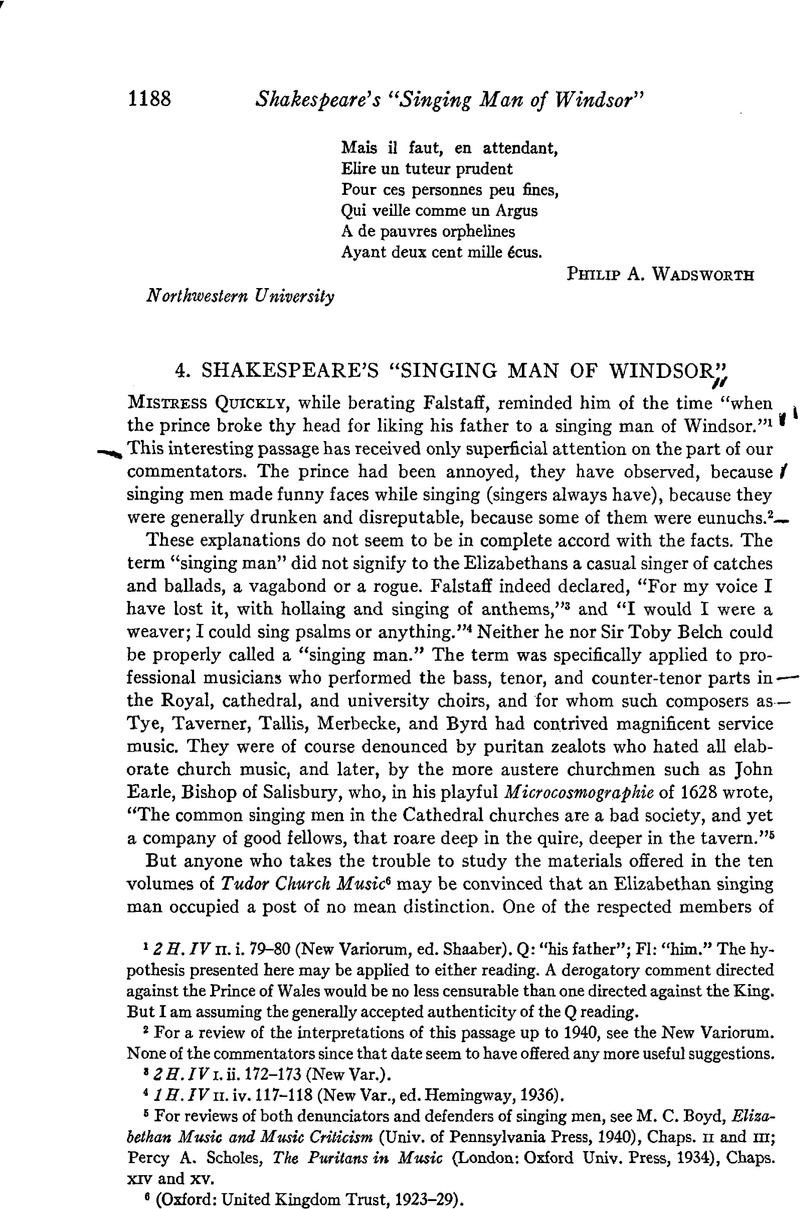No CrossRef data available.
Published online by Cambridge University Press: 02 December 2020

Note 1 in page 1188 2H.IV II. i. 79–80 (New Variorum, ed. Shaaber). Q: “his father”; FI: “him.” The hypothesis presented here may be applied to either reading. A derogatory comment directed against the Prince of Wales would be no less censurable than one directed against the King. But I am assuming the generally accepted authenticity of the Q reading.
Note 2 in page 1188 For a review of the interpretations of this passage up to 1940, see the New Variorum. None of the commentators since that date seem to have offered any more useful suggestions.
Note 3 in page 1188 2B.IV i. ii. 172–173 (New Var.).
Note 4 in page 1188 1H.IV II. iv. 117–118 (New Var., ed. Hemingway, 1936).
Note 5 in page 1188 For reviews of both denunciators and defenders of singing men, see M. C. Boyd, Elizabethan Music and Music Criticism (Univ. of Pennsylvania Press, 1940), Chaps, II and in; Percy A. Scholes, The Puritans in Music (London: Oxford Univ. Press, 1934), Chaps, xIv and xv.
Note 6 in page 1188 (Oxford: United Kingdom Trust, 1923–29).
Note 7 in page 1189 So he was termed in 1776 by Sir John Hawkins in A General History of Music (London : Novello, 1875), i, 469, and in 1789 by Dr. Charles Burney in A General History of Music (London), III, 91. He composed some of the music for Queen Elizabeth's Entertainment at Elvetham in 1591.
Note 8 in page 1189 See Dora H. Robertson, Sarum Close (London: Jonathan Cape, 1938), Chap, m; John S. Bumpus, A History of English Cathedral Music (London: T. Werner Laurie, n.d.), Chap, N.
Note 9 in page 1189 See Bumpus, Chap, III; . H. Fellowes, Organists and Masters of the Choristers of St. George's Chapel in Windsor Castle (London: S.P.C.K. House, 1939); The Old Cheque-Book of the Chapel Royal, ed. E. F. Rimbault (Camden Soc, 1872).
Note 10 in page 1189 See Fellowes (op. cit.) and J. E. Tighe, Annals of Windsor (London, 1858).
Note 11 in page 1189 Philip Sidney, Works, ed. Feuillerat (Cambridge Univ. Press, 1923), iii, 53. A reading which I think need not be taken seriously is “Let the Singiniam in Henry Fourths time”— Sidney, Defense of Poésie, A Letter to Queen Elizabeth, etc., ed. G. E. Woodberry, Humanist's Library (Boston: Merrymount Press, 1908), iv, 93.1 am willing to accept Woodberry's “Singiniam,” whom he makes no attempt to explain, as the best he could do with the Elizabethan script for “singing man.”
Note 12 in page 1190 Holinshed, 1587 éd., iii, 514–516; 1808 ed. (London), iii, 9–13.